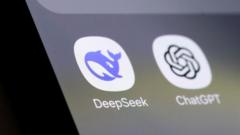DeepSeek's impressive arrival has shaken the technology industry, causing stocks to plummet as fears mount over US competitiveness in AI. The chatbot, developed at a fraction of the cost of its American counterparts, has emerged as a contender in the AI space, prompting reactions from US tech leaders and market analysts alike.
China's DeepSeek AI Disrupts Tech Landscape, Challenges US Dominance

China's DeepSeek AI Disrupts Tech Landscape, Challenges US Dominance
The launch of DeepSeek, a cost-effective AI chatbot from China, has sent shockwaves through the tech industry and triggered significant market sell-offs in the US, raising questions about American leadership in AI.
The Chinese AI app DeepSeek has made an unexpected entrance into the technology sector, rapidly gaining popularity and challenging America's long-held dominance in artificial intelligence (AI). The app, developed at a strikingly low cost compared to its American rivals, was the most downloaded free app on Apple's US App Store over the weekend and has since triggered significant sell-offs in major tech stocks.
Marc Andreessen, a prominent venture capitalist, referred to this moment as AI's "Sputnik moment," highlighting the potential implications of DeepSeek on the geopolitical tech landscape. The release has caused a notable decline in American technology stock values, with Nvidia, a leading AI chip designer, experiencing a staggering 17% drop in shares, marking a loss of nearly $600 billion in market capitalization.
The financial disparity between DeepSeek and its competitors has raised eyebrows across Silicon Valley. While OpenAI, the creator of ChatGPT, reportedly spent around $5 billion last year on development, DeepSeek's creators claim their product was developed for a mere $5.6 million. This has fueled skepticism among analysts regarding DeepSeek's financials, with some questioning whether the chatbot is truly viable in the long term.
Veteran analyst Gene Munster expressed his concerns about the soundness of the figures provided by DeepSeek's developers and speculated whether the startup's operations were being subsidized. Despite these uncertainties, he acknowledged that the chatbot is surprisingly effective, leading to skepticism about its success in the market.
DeepSeek's sudden rise follows a period of American optimism, highlighted by a recent press conference featuring AI industry leaders and former President Trump, who announced a massive joint investment initiative aimed at advancing AI infrastructure in the US. However, Trump's response to DeepSeek's emergence was to label it a "wake-up call," implying that the US workforce needs to pivot towards more cost-effective AI solutions, despite predictions of American superiority in AI technology.
The emergence of DeepSeek raises questions about the necessity of high capital and significant computing power previously thought essential for AI development. Analysts are pondering whether energy-intensive models will still be the norm or if more efficient approaches might now be sufficient.
DeepSeek asserts that its technology is built using existing and open-source resources, and the company has been strategically acquiring essential AI components over the years. They have been deploying Nvidia's H800 chips in their models, which may compel US policymakers to reassess restrictions limiting the sale of advanced chips to Chinese firms.
While Sam Altman of OpenAI acknowledged the impressive nature of DeepSeek's cost-performance ratio, he maintained confidence that OpenAI would continue to produce superior models. Starved of challenges, the tech industry may find renewed vigor in competition, as the race for advancements in artificial intelligence heats up between the US and China. As history has shown during the space race, unexpected developments can catalyze innovation and provoke a reevaluation of priorities.






















